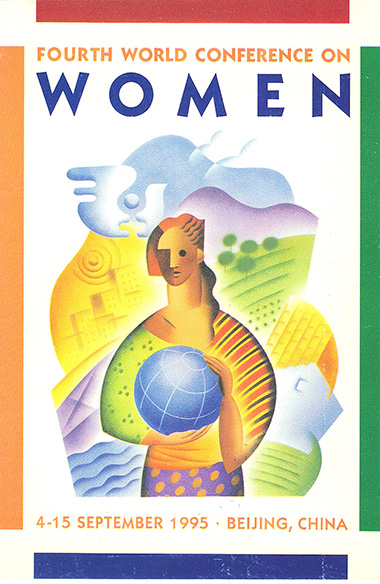My 20th anniversary of working at IFPRI coincides with the 20th anniversary of the UN World Conference on Women in Beijing, where then First Lady Hillary Rodham Clinton proudly proclaimed that women’s rights are human rights. I had been hired to lead IFPRI’s research program on gender and intrahousehold issues a few months before the conference, and the trip to Beijing was my first overseas trip for the Institute. The atmosphere there was both festive and chaotic. Women (and men) from all over the world were at the official UN conference as well as at the NGO conference in Huairou; these sites were deliberately a fair distance from each other, to keep the more vocal NGOs out of the sedate UN-style discussions. I remember shuttling from one site to the other in rickety buses without air conditioning alongside the other participants—such minor inconveniences did not dampen our spirits at all!
My IFPRI colleagues and I produced a Food Policy Report for Beijing, “Women: The Key to Food Security,” in which we summarized the empirical evidence on women’s roles as producers, income earners, and caregivers—in their capacity as guardians of household food and nutrition security. Before the 1990s, quantitative evidence on women’s role in food security was scarce. There were many anthropological studies, but these were mostly small ethnographic studies and could not be generalized across different countries and contexts. For the first time, we were able to present numbers drawn from empirical studies based on large data sets, from a variety of contexts and cultures. These results demonstrated that women’s lower access to productive inputs was responsible for their lower yields relative to men, suggesting inefficiencies in resource allocation within the household, that women’s incomes tended to be spent on child health and nutrition, and that women’s time was important for the well-being of families as well as their own.
The audience of policymakers and NGO representatives in Beijing was hungry for this type of research. It was clear that there was a demand for evidence-based policymaking on gender. But it was still difficult to convince policymakers that there were gains to achieving gender equality. These hard-nosed decisionmakers were not convinced that women’s empowerment was an end in itself; we had to find the numbers to show that empowering women also made good economic sense. A major challenge was that the data to test many hypotheses did not yet exist at the level of disaggregation that we needed—most data were collected at the household level, and did not distinguish between resources controlled by men and women.
The evidence gap convinced us to undertake an ambitious research program in the 1990s when we gathered new data in four focus countries—Bangladesh, Ethiopia, Guatemala, and South Africa—to test models of household decisionmaking. We wanted to understand better how men and women made decisions and allocated resources within households across very different cultures and contexts. To do this, we designed questionnaire modules that looked at the assets that men and women brought to marriage. We found out that the bargaining power of men and women at the time of marriage—which reflected the physical and human assets each possessed as well as external policy interventions—also affected how men and women allocated resources within marriage. This had important implications for household and individual well-being. Although these studies were observational (not based on experimental evidence), they showed that resources controlled by women tended to be correlated with better educational, health, and nutrition of children.
The results from these studies influenced the design of Mexico’s PROGRESA, the forerunner of Oportunidades, a nationwide conditional cash transfer (CCT) program that, for the first time, transferred cash directly to the mother, rather than to the “household.” The impact evaluation of PROGRESA, conducted by IFPRI, was also a forerunner of impact evaluations using randomized controlled trials. The success of Mexico’s program influenced the design of CCTs worldwide. One important lesson in the implementation of CCTs, however, was that designs could not be adopted wholesale without adaptation to local conditions, because gender norms are very context- and culture-specific. Another important lesson was that programs should not consider women alone, but women in relation to men and other members of the household and community. In fact, the danger of targeting programs only to women was not only the potential backlash from men but also the increased demands on her own time.
Assets emerged as an important factor that not only affected the bargaining power of men and women, but also the well-being of households over time. Our realization that men’s and women’s property rights over assets mattered, and that these rights could be influenced by both policy and agricultural development programming, led to a new research program investigating how agricultural development programs can affect the gender asset gap. Our work on intrahousehold decisionmaking and assets then led to work developing measures of women’s empowerment, such as the Women’s Empowerment in Agriculture Index (WEAI), which has now been implemented in 19 Feed the Future countries and is being adopted by other development organizations throughout the world.
Policy, research, and practice on gender in food security has evolved greatly since the 1990s. Gender equality and women’s empowerment became enshrined in the United Nations’ Millennium Development Goals. Measures of women’s empowerment are becoming part of projects’ monitoring and evaluation system. NGOs are no longer considered second-class citizens in development programming; indeed they have taken the lead in implementing innovative programs at scale to empower women. Most importantly, our ideas have moved on from women alone as being the “key to food security” to looking at gender dynamics—relationships between women and men—and involving both women and men as partners in improving food security and the well-being of their households and communities.







